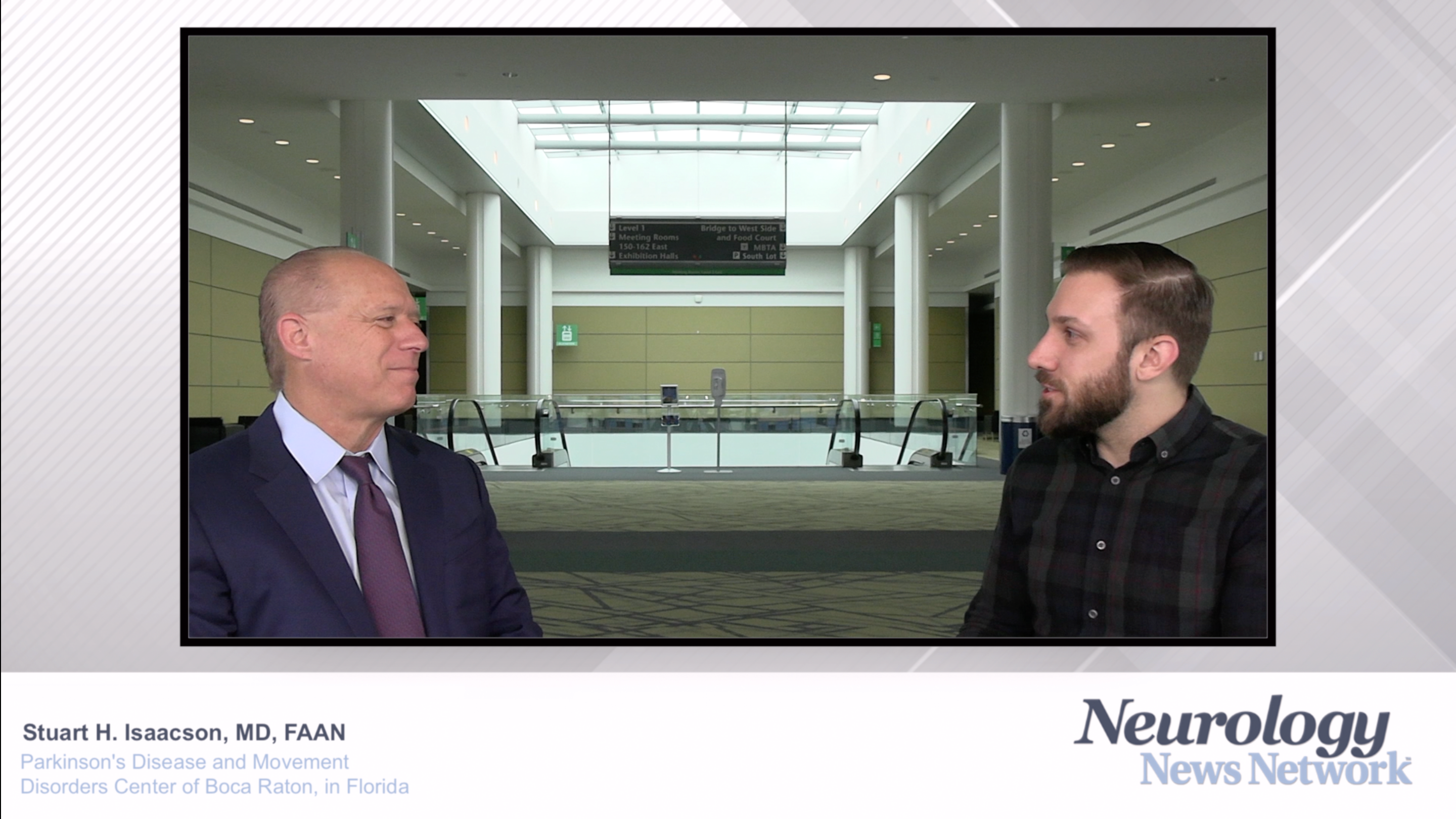
Personalized Care Plans for Patients With Parkinson Disease

Stuart H. Isaacson, MD, FAAN, offers insight into the importance of tailoring care to the individual when it comes to managing patients with Parkinson disease.
Editor's note: Because of an unfortunately unaddressable issue, the audio for this episode may be slightly distorted at times. Please see the transcript below for clarity.
Matt Hoffman: I'm Matt Hoffman, and I'm here with Dr. Stuart Isaacson. It's great to talk to you today, here at the American Academy of Neurology Annual Meeting—the 75th Annual Meeting.
Stuart H. Isaacson, MD, FAAN: Excited to be here with you.
Matt Hoffman: Great to sit down with you. We're obviously here to talk a little bit about improving the outcomes of patients with Parkinson disease, particularly through the personalization of treatment. Personalized medicine is a goal we've all been hoping to achieve, and we're making some progress toward it. For you, you know, as with PD being a chronic progressive condition, patients often benefit from personalized care. For you. What does personalized care in Parkinson disease actually mean?
Stuart H. Isaacson, MD, FAAN: Well, it's really core to how we approach our patients in the clinic. We have to really integrate not just the knowledge we have about Parkinson disease clinically and the symptoms that occur, we have to tell our patients about the therapeutic options, about medications being developed in research programs, and to it to combine that with wellness programs. But we have to really focus that not in isolation, but to each each individual patient and how Parkinson's effects that individuals. There are so many motor and nonmotor symptoms that can occur and that constellation impacts each other [facet], and also our choice of therapies.
Matt Hoffman: And it's interesting you bring that up because obviously there are a ton of factors that go into developing that treatment plan. What are some of those factors? If you're sitting down with a patient, [what are the factors] you're thinking you need to consider when managing that regimen and how you're going to best treat this individual?
Stuart H. Isaacson, MD, FAAN: I think you really want to know, when someone comes in with Parkinson: Who are you? Where do you come from? What do you do? What do you do in your life? What are you doing now, with family? Do you have hobbies? How will these going to be impacted? And then, find out how Parkinson's affects their lives, their relationships, their activities, their hopes, and their dreams. And once we understand a person and where they fit in their lives, we can understand how Parkinson affects their lives, and we can really begin to define, together with our patients, their families, and their caregivers, what we call shared clinical decision-making. What's the best thing to do now? Nothing? A new medication? An old medication? Changing this or changing that, or a lifestyle modification?
Matt Hoffman: It's interesting, that you bring up lifestyle because I think one of the things, particularly for the lay public or even clinicians who don't practice in the movement disorder field, is how age and work and hobbies—things patients do outside of just the symptoms they're dealing with—affect the disease. For you, how do those aspects of a person's life, or rather patients' lives, guide what treatment options you might consider for that
person?
Stuart H. Isaacson, MD, FAAN: It's important. Down in South Florida, a lot of people are retiring, or retired, or half retired, and so on. People often say, "Well, I want to keep people working." That's absolutely true. But we also want to keep people hobbying and doing their activities. And it may be true that not all my patients have said the words, "Can you get me working more?" But they certainly say, "Can you get me playing pickleball," or, "Can you get me back playing my bridge," or "Can you give me my golf game back, I peter out on the 10th hole." For all of these types of ideas [for a treatment plan], we have to find out what the patient values, and in a patient-centered way, address that. Not some external idea that we think that's not as important to them. That's the core of what we're trying to do, help our patients live how they want.
Matt Hoffman: And obviously, these regimens are more than just a treatment, right? Behavioral modifications and lifestyle adjustments, those things coming to come into play. In what scenarios, and perhaps maybe with which patients, do you consider nonpharmacologic therapeutics?
Stuart H. Isaacson, MD, FAAN: Well, I think there's a lot of different ways of thinking about nonpharmacologic, right, and pharmacological. In the past we used words like holistic—which, really, we're moving away from, to think about a comprehensive approach, to sort of supply everything a patient might need to address what could be affected or constricted by Parkinson disease or one of these other related movement disorders. It's everything from activity and exercise to socialization. It's having a good mindfulness and psychological outlook. It's having hope, which is so important.
But none of that really works well unless the medications are optimized. Unless they're on the right medicine for them, at the right dose, taken at the right time of date for both them, and for how the medication works. And then, when we combine everything together, can we hope to improve outcomes for both the short-term but importantly, also the long-term. So really, it's looking long-term now with the identification [of Parkinson], we have emerging biomarkers and genetic ideas that are trying to see what's a patient likely to do in the future and how can we try to make that better, not just today, but in the future.
Newsletter
Keep your finger on the pulse of neurology—subscribe to NeurologyLive for expert interviews, new data, and breakthrough treatment updates.










